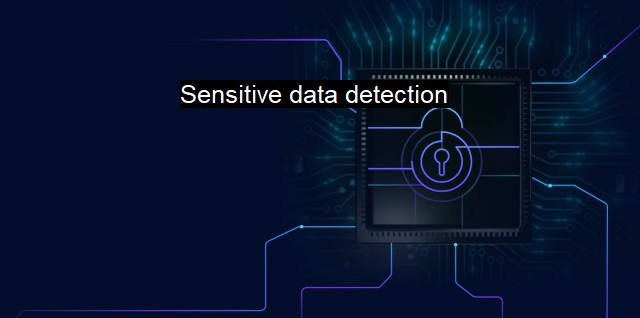What is Sensitive data detection?
Securing Confidential Information: The Importance of Sensitive Data Detection in Cybersecurity and Antivirus Programs
Sensitive data detection refers to processes or tools involved in discovering, identifying, and safeguarding valuable information to prevent unauthorized access or data breaches. detecting sensitive data becomes of utmost importance to ensure the protection of vital digital assets.Sensitive data exist across various organizations and sectors which dramatically vary in value and confidentiality levels. These data involve individual information that could include personally identifiable information (PII), credit card numbers, or other sensitive materials. Corporate information, on the other hand, could include trade secrets, proprietary data, particular financial information, or strategic plans for an organization. All of these data sets need to be adequately protected to preserve privacy, ensure regulatory compliance, and uphold business operations and intelligence.
Sensitive data detection involves different aspects of security protocols ranging from information storage, handling, and information sharing, It includes processes that are involved in accurately locating, managing, and securing potential data targets. Data patterns are often identified which indicate sensitive data sets, and tools apply complex pattern recognition or machine learning algorithms to segregate sensitive data from everyday information packets.
Sensitive data detection plays a crucial role in ensuring the secure, efficient processing of large volumes of data. It involves ensuring that there is the identification, classification, remediation, and policy enforcement in dealing with sensitive data throughout its lifecycle. The detection of sensitive data helps in inventorying data at scale and brings about visibility into environments handling vast amounts of data to detect unexpected or unauthorized access potentially indicative of a cyber attack.
The cybersecurity industry has seen a sharp increase in the development of sensitive data detection tools due to the unprecedented rise of cyber threats. These tools help in spotting data at risk of a breach like credit card numbers, National Identification Numbers, or medical records to protect data in transit, at rest, or use regardless of where it is found - cloud, on-premises, or hybrid systems.
Antivirus programs have data detection capabilities either built-in or as standalone tools. Their function is to scrutinize files and databases for sensitive information and escalate actions for their protection. They run scan processes, identify critical data sets, and deploy remedial measures either to prevent potential data breach attempts or to quarantine files that can pose a threat to the sensitive data environment.
Sensitive data detection also provides insight into the varying degrees of risk involved in handling information. Once sensitive data is spotted, depending on the set security protocols, organizations take steps, such as encrypting at-rest data, secure-sharing policy enforcement, restricting access credentials, or constant monitoring of databases for irregular or suspicious activities.
Much of the value of antivirus and cybersecurity disciplines lies in their protection of sensitive data. The successful detection and safeguarding of sensitive data implicitly indicate the robustness of one's cybersecurity defences against cyber threats. the static and dynamic world of sensitive data means a constant vigilance to threats is necessary. Consequently, sensitive data detection emerges as a critical cupola for digital infrastructure, essentially paying the way for a holistic cybersecurity posture. It sets the ball rolling for complex systems, processes, or even constructs like data loss prevention (DLP), data pseudonymization, data sovereignty, among others in the realm of data regulation and security in modern digital enterprise ecosystems.

Sensitive data detection FAQs
What is sensitive data detection?
Sensitive data detection is the process of identifying and locating sensitive or confidential information within a system or network, such as personal identification information, financial details, or trade secrets, to protect them from unauthorized access, theft, or misuse.Why is sensitive data detection important in cybersecurity?
Sensitive data detection is critical in cybersecurity as it helps identify and prevent potential threats to sensitive or confidential data, which can cause significant harm to the organization or its clients. It helps ensure compliance with regulations and legal obligations regarding data protection and privacy.How does antivirus software help with sensitive data detection?
Antivirus software uses various detection techniques such as signature-based, behavior-based, and machine learning algorithms, to identify and isolate potential threats to sensitive data. They scan files, email attachments, and network traffic to detect malware, ransomware, spyware or any kind of malicious software that may steal or expose sensitive data.What are the best practices for sensitive data detection?
Some best practices for sensitive data detection include classifying data according to its sensitivity level, limiting access only to authorized personnel, using encryption for data at rest and in transit, regularly monitoring logs and alerts for unusual activity, and conducting periodic security assessments and audits.| | A | | | B | | | C | | | D | | | E | | | F | | | G | | | H | | | I | | | J | | | K | | | L | | | M | |
| | N | | | O | | | P | | | Q | | | R | | | S | | | T | | | U | | | V | | | W | | | X | | | Y | | | Z | |
| | 1 | | | 2 | | | 3 | | | 4 | | | 7 | | | 8 | | |||||||